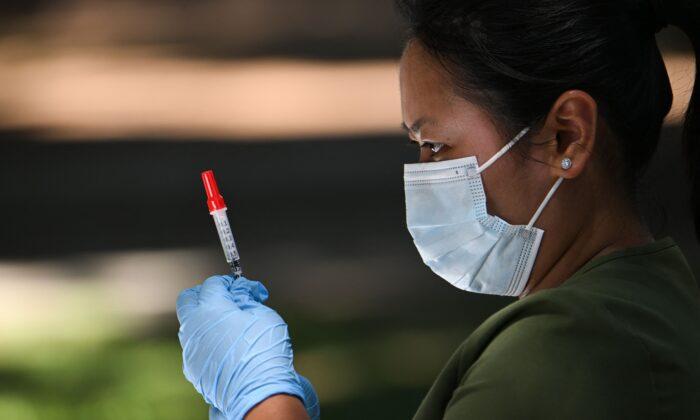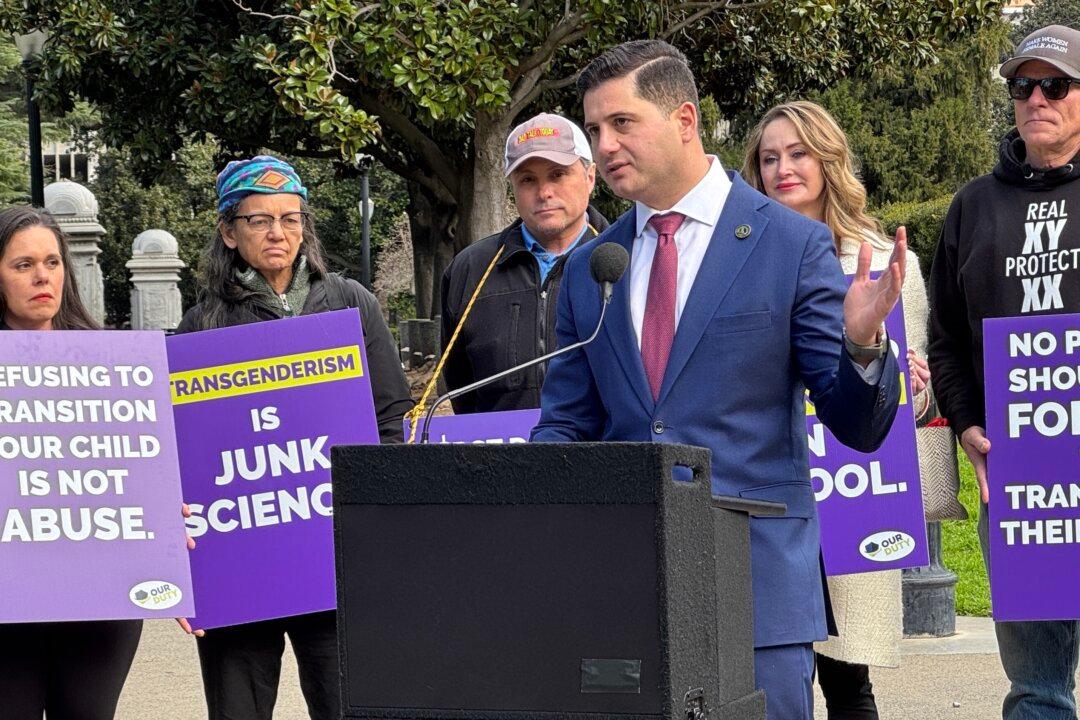As the number of confirmed monkeypox cases rose to more than 1,300 in California on Aug. 9, health officials and the LGBT community are demanding the federal government step up its response to the outbreak.
Those 1,300 cases account for about 20 percent of the United States caseload, according to Dr. Vivek Jain, a disease control expert who testified at an informational hearing of the state Senate Select Committee on Monkeypox on Tuesday.
Public health officials from four California counties reported there were 647 confirmed cases in Los Angeles, 501 in San Francisco, 98 in San Diego, and 70 in Riverside.
“These numbers are being updated daily due to the speed at which new cases are occurring, and I’m strongly supportive of the emergency declarations that have been made by the City of San Francisco, California state and the federal government in recent days,” Jain said.
California Gov. Gavin Newsom announced a state of emergency over monkeypox on Aug. 1 just days before the Biden administration declared a public health emergency and announced plans to bolster its response efforts on Aug. 4.

The next day, the U.S. Centers for Disease Control and Prevention (CDC) issued a warning to homosexual men to “take a temporary break” from sexual activity until they’re vaccinated since monkeypox cases are occurring primarily among gay and bisexual men. The CDC also advised those in high-risk groups to limit their sexual partners, avoid “spaces” for anonymous sex with multiple partners, use condoms, and wear gloves during some sexual activities.
Sen. Scott Wiener (D-Francisco), who chairs the newly formed committee, criticized the federal government for allegedly not replacing 20 million doses of the monkeypox vaccine in the national stockpile when they expired in 2019.
“In San Francisco, honestly, it’s a little bit like The Hunger Games when it comes to accessing vaccinations,” Wiener said. “It is heartbreaking at San Francisco General Hospital, where the clinic will open for a few days or a week, and then shut down because it runs out.”
When the clinic does reopen, people desperate for the vaccine show up in the early morning hours and wait in lines as long as five blocks, he said.

Several public health experts testified that although the disease is extremely painful for many patients, it is not usually fatal.
Wiener called for government assistance for monkeypox patients who are told to remain isolated for three to four weeks to curb the spread of the disease. Many are either in too much pain or otherwise unable to work because of the nature of their jobs, he said.
He’s also pushing for an additional $38.5 million to be included in the state budget to deal with the crisis.
Dr. Erica Pan, state epidemiologist and deputy director of the California Department of Public Health’s (CDPH) Center for Infectious Diseases as well as county public health directors Dr. Grant Colfax in San Francisco, Dr. Muntu Davis in Los Angeles, Dr. Kimberly Saruwatari in Riverside, and Dr. Elizabeth Hernandez in San Diego backed demands to streamline production and distribution of the vaccine so people can obtain it faster, and pushed for increased funding and staffing at health facilities to deal with the outbreak.
Saruwatari warned that the number of cases in the Palm Springs area, known for its large LGBT population, are increasing. Of the 70 cases “almost all of them are recorded in the greater Palm Springs area of the Coachella Valley,” she said.
Though rare, Saruwatari said there have been cases of women and children with the disease.
“I want to be very clear that monkeypox can infect anyone ... regardless of your age, your gender or your sexual orientation,” she said. “And while no deaths have been recorded in Riverside County, there have been a few hospitalizations, and those who are infected report painful and debilitating symptoms that can last for weeks.”
The CDPH reports it is closely monitoring the disease statewide and nationally to rapidly identify new cases.

Monkeypox spreads through close, personal, often skin-to-skin contact, touching objects, surfaces and fabrics such as clothing, bedding, or towels used by an infected person, and through contact with respiratory secretions.
“It’s also possible for people to get monkeypox from infected animals, either by being scratched or bitten by the animal or by preparing or eating meat or using products from an infected animal,” according to the CDC.
Pregnant women can also spread the virus to their unborn child.
People with monkeypox get a rash that can initially look like pimples or blisters and may be painful or itchy. Other symptoms of monkeypox can include fever, chills, swollen lymph nodes, exhaustion, muscle aches and backache, headache and respiratory symptoms such as a sore throat, nasal congestion, or cough.
Sen. Rosilicie Ochoa Bogh (R-Yucaipa), the lone Republican on the new committee, asked whether pets could spread the virus to humans.
In response, Dr. Oliver Bacon of the San Francisco City Clinic said in endemic countries the disease has spread from small rodents to humans, and although there have been no documented cases of pets transmitting the virus to humans in the current outbreak so far, the risk is a “valid concern.”
David Watson, a San Francisco resident, told the committee he believes he spread monkeypox to his two dogs, since they also developed symptoms.
Watson and Dan Tavares Arriola, a city councilor in Tracy, Calif., said at the hearing they both experienced difficulty and delays getting treatment for the disease.
LGBT advocacy leaders from groups including Equality California and the Los Angeles LGBT Center, as well as the San Francisco AIDS Foundation and the United Food and Commercial Workers labor union supported the committee efforts.
Meanwhile, Florida Gov. Ron DeSantis said at an Aug. 3 news conference he won’t declare a state of emergency over monkeypox, and states that do will eventually “abuse those emergency powers to restrict your freedom.” There were 500 cases of the disease in Florida at the time.
“Any of the politicians trying to scare you about this, do not listen to their nonsense,” DeSantis said. “Anything we deal with from a public perspective, we are not doing fear. We are going to do facts.”
Senate President Pro Tem Toni Atkins (D-San Diego) appointed Wiener to the new monkeypox committee on Aug. 3, along with Ochoa Bogh and Senators Susan Talamantes Eggman (D-Stockton), John Laird (D-Santa Cruz), Lena Gonzalez (D-Long Beach), Richard Pan (D-Sacramento).





